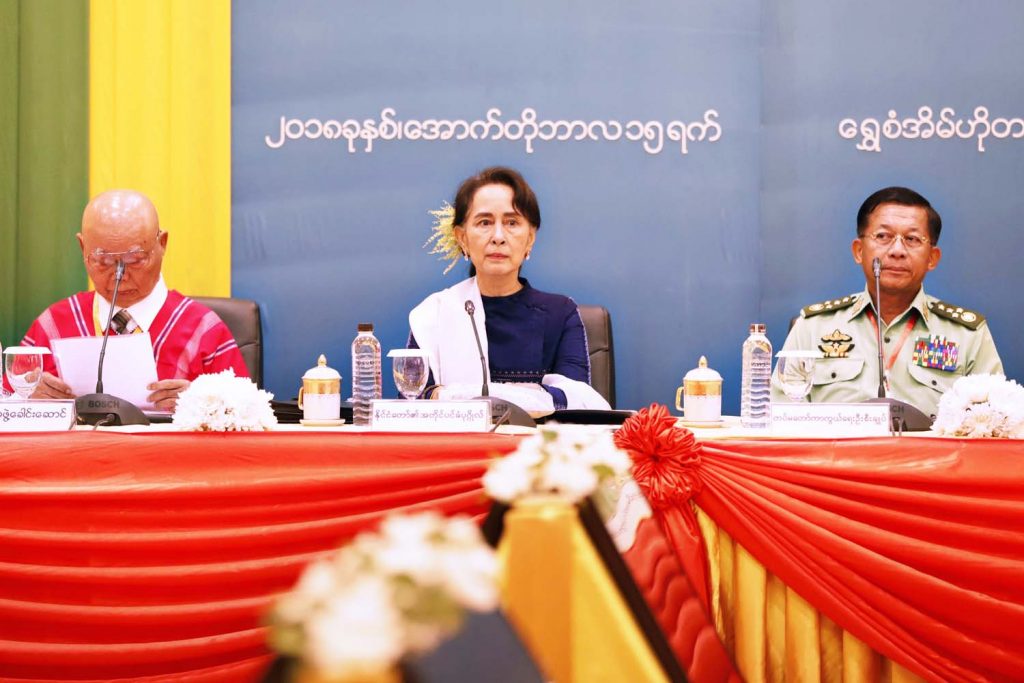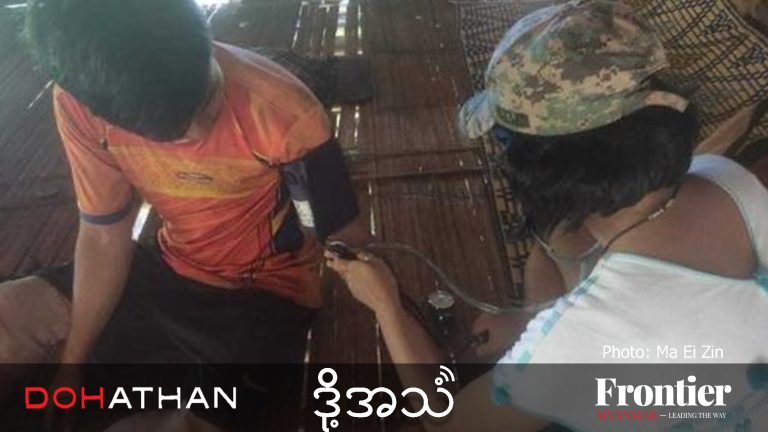The peace process has made little progress since the National League for Democracy took office and stakeholders will need to embrace a new approach if the guns of war are to be silenced under the next government.
By SITHU AUNG MYINT | FRONTIER
The Union Election Commission’s announcement that the general election will be held in November means that the two months of campaigning will begin in September and end two days before voting takes place.
The election campaign period has implications for the peace process. Political parties, including the ruling National League for Democracy, will be focusing on their campaigns and will have little time to devote to complex negotiations involving the government, Tatmadaw and ethnic armed groups. The election will be followed by the installation of new governments and peace process will not be able to resume until April next year at the earliest. This is why the NLD government is pushing to hold another 21st Century Panglong Union Peace Conference before the election campaign period begins – the last opportunity to do so before its term ends.
Government spokesperson U Zaw Htay predicted at a regular news conference on May 30 that part three of the Union Accord would be signed at the next peace conference if it is held in the coming weeks. Zaw Htay said the accord consists of three parts. The first part includes topics not included in the original agreement that could be the subject of further negotiations. The second is the phases to be implemented after the 2020 election, and the third involves agreeing on the fundamental principles of a federal Union.
The reason for addressing post-election matters is to provide some assurance that the peace process will continue regardless of the election outcome. Although the NLD is widely expected to win enough seats to nominate the president and form the next government, the accord will provide a greater certainty to all parties. The post-election aspect of the accord is also a sort of a roadmap for the peace process, and represents a commitment from the NLD if it does win another term in office.
But how much progress has the NLD government headed by State Counsellor Daw Aung San Suu Kyi made during its first term?
The NLD government’s efforts to advance the peace process have involved three different sets of negotiations: with the 10 ethnic armed groups that are signatories of the Nationwide Ceasefire Agreement; with the Arakan Army, Ta’ang National Liberation Army, Kachin Independence Organisation and the Myanmar National Democratic Alliance Army (also known as the Kokang group); and, with the United Wa State Party and National Democratic Alliance Army (also known as the Mongla group), both of which signed ceasefire agreements with the military government in 1989.
The NLD government and the Tatmadaw have negotiated with NCA signatories many times. The NLD hopes that through negotiations, the all-inclusive 21st Century Panglong Union Peace Conferences will produce agreements that will be included in the Union Accord and approved by the Union Parliament. Then, with the approval of the Union Parliament, the 2008 Constitution will be amended based on the Union Accord. The NLD hopes that in this way national peace will be achieved and a federal Union established.
Aung San Suu Kyi had hoped to hold about three 21st Century Panglong Union Peace Conferences each year during her government’s five-year term, and that this would enable all fundamental agreements to be reached by 2020. In reality, the government could only hold three peace conferences in four years and they have produced agreement on 51 points of the Union Accord.
Some analysts say that the most important and essential points for achieving a lasting peace and building a democratic federal Union are yet to be agreed upon for inclusion into the Union Accord. Taking all into account, the NLD government has not been as successful as expected at making peace with NCA signatories.
Meanwhile, efforts continue to try and sign bilateral ceasefires with the KIO, AA, MNDAA and TNLA. Fierce fighting continues in parts of Rakhine State near the border with Chin State’s Paletwa Township between the AA and the Tatmadaw, and there are sporadic clashes in northern Shan State. The government has also been unable to persudade the UWSA and NDAA groups, which behave as if they are separate sovereign states, to sign the NCA or join the mainstream peace process.
The significant progress achieved in the peace process by the Union Solidarity and Development Party government of President U Thein Sein raised high expectations that, quite frankly, have not been realised since the NLD government took office.
This raises the question: Why was the USDP administration more successful in advancing peace that the NLD government?
One reason is that Thein Sein assigned Minister for the President’s Office U Aung Min, an amiable former general, to lead the peace process. Aung Min worked hard to gain the confidence of the leader of every ethnic armed group. Through Thein Sein, he also tried to achieve the understanding and acceptance of Tatmadaw chief Senior General Min Aung Hlaing.
The approach the government took was that ethnic armed groups would retain control over territory while peace negotiations continued and if they lost trust in the process they could return to armed struggle. Importantly, the Tatmadaw also contributed to the success of the process by making compromises like never before during 60 years of civil war. The Karen National Union, which had been fighting the government since soon after independence in 1948, signed a bilateral ceasefire in January 2012 and was among the first batch of eight EAOs that signed the NCA in October 2015.
When the NLD took office in late March 2016, it inherited a peace process that had been making significant progress during Thein Sein’s government, largely on the basis of trust built with ethnic armed group leaders.
Domestic and foreign political analysts were optimistic that the peace process would make further gains under a democratic civilian government that accepted the concept of a federal Union. Aung San Suu Kyi, who had famously said months before the NLD took office that peace would be her government’s first priority, appointed her personal physician, Dr Tin Myo Win, a trusted friend, to lead the peace process. A review of his work over the past four years suggests he is not knowledgeable about ethnic affairs or the nation’s years of civil conflict and that he does not seem to have the confidence of either the leaders of ethnic armed groups or the Tatmadaw. Because the NLD government has a weak negotiator, ethnic armed groups and the Tatmadaw have been left to negotiate head on.
Another significant change has involved the Tatmadaw. When former general Thein Sein was president, Min Aung Hlaing took a more moderate line towards ethnic armed groups, but that changed after the NLD took office.
At the tripartite summit in October 2018 that brought together the government, Tatmadaw and ethnic armed group leaders, Min Aung Hlaing insisted that any peace agreement must include provisions against secession and to establish a single defence force. The consequences of that speech are among the reasons why there has since been little progress in the peace process since.
Ethnic armed groups must also share some of the blame for setbacks to the peace process. In Rakhine State, the Arakan Army has been attacking public servants and police, as well as the Tatmadaw. The AA has also abducted or kidnapped lawmakers, members of the NLD, and civilians believed to work for the government. The activities of the AA have united the government and the Tatmadaw, culminating in the decision in March to declare it a terrorist organization. This designation has complicated the peace process, because in the eyes of the government it sets the AA apart from other groups. However, the AA is insisting that it will not negotiate with the government one-to-one, which makes it difficult for the government to reach bilateral ceasefires with not only the AA but also the KIO, TNLA and MNDAA.
For Myanmar to achieve permanent peace, the Tatmadaw and ethnic armed groups must have a genuine desire to end conflict. They must be willing to negotiate and make compromises, especially the more powerful Tatmadaw. Unless both sides share a genuine will for peace, it will remain a dream. The government must be able to negotiate between the two sides.
The peace process has not made progress under the NLD government because of the hardline attitudes of the Tatmadaw and some ethnic armed groups, and the weak capability of government negotiators.
If the NLD wins the election and forms the next government, it will need to review its entire approach to the peace process. The Tatmadaw and some ethnic armed groups will also need to review their approach to peace. Only then can the peace process move forward again.







